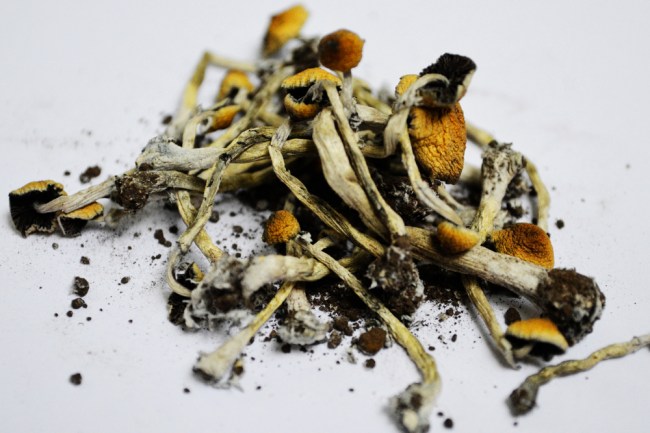
shutterstock
It is hard to believe that it has been more than two decades since California became the first state to legalizing marijuana for medical use. Of course, this reform, which was approved by the majority of voters in 1996, set off a chain of events that has since contributed to the end of prohibition in some form or fashion in over half the United States. As impressive as that sounds, this free nation of ours is still far from regulating cannabis in the same way as it does with alcohol and tobacco. Perhaps this is why it is an absolute trip that a couple of states are pushing this year to legalize magic mushrooms.
Much like marijuana, magic mushrooms (psilocybin) has been considered a Schedule I dangerous drug since President Nixon assembled the goon squad known as the U.S. Drug Enforcement Administration (DEA). This classification suggests that psilocybin has no medicinal value and comes with a high potential for abuse. But throughout the years, scientists have determined that this hallucinogenic fungi, which often grows wild in cow dung, has therapeutic components that have been shown beneficial in helping people who suffer from various health conditions ranging from depression to drug addiction.
“If psilocybin were an approved medication, it would likely be prescribed for mood disorders such as depression, or depression related to a life-threatening illness,” Albert Garcia-Romeu, a researcher at Johns Hopkins University School of Medicine, told Yahoo. “Other promising areas include use of psilocybin as an aid for anxiety-related conditions, and addictions, many of which can be difficult to manage effectively, even with the best available treatments.”
But in spite of the many health benefits associated with psilocybin, simple possession of magic mushrooms in the United States can get a person put in jail. In some cases, this drug offense can lead to a felony conviction – a blemish on a person’s criminal record that has the power to hinder opportunities related to college, work and living space.
Indeed the repercussions stemming from a minor drug-related conviction can wreak havoc on future plans. This is the reason that organizations in two states are working to change the law.
California
California must be trippin’! There is currently an initiative circulating throughout the state aimed at legalizing magic mushrooms in a manner similar to alcohol and tobacco.
The proposal, which was introduced by veteran cannabis advocate Kevin Saunders, “exempts adults, 21 and over, from criminal penalties and decriminalizes adult use of psilocybin.” If passed, the law would also except “adults, 21 and over, from California health and safety codes which otherwise prohibit possession, sale, transport and cultivation of psilocybin.” This means the measure could give way to a legal psilocybin market, perhaps allowing magic mushrooms to be sold in close proximity to recreational marijuana.
Right now, the biggest challenge for Saunders is collecting the signatures needed to earn a spot on the 2018 ballot. California law requires the campaign to gather 356,880 petitions to enter this phase. As of January, the Decriminalization of Psilocybin initiative had reached the 25 percent mark. It has a few more months to collect the rest.
So, what are the chances of this measure going the distance? The short answer is: not good. These types of campaigns can cost millions of dollars to run successfully. And unfortunately, the larger drug reform groups, like the Drug Policy Alliance, have so far shunned the initiative. These folks are more concerned with getting California’s legal marijuana market up to speed. But it is a step in the right direction. After all, the first medical marijuana initiative was proposed in California back in 1972. Therefore, it could take a couple of decades for the concept of legal psilocybin to gain traction.
Colorado
They’re taking the mile high city up a notch. A group called Colorado for Psilocybin is seeking approval to begin collecting signature to put the question of magic mushroom decriminalization on the 2018 ballot. The goal of this effort is to eliminate the criminal penalties associated with the possession of this substance. The organization wants to make a first time offense for up to two pounds of mushrooms punishable with a small fine. Although the cost of the citation would increase by $100 for each subsequent offense, the penalty would be capped at $999 per ticket. The group credits the area’s push to legalize marijuana for the inspiration to pull magic mushrooms out of the underground. Unfortunately, however, the initiative would not apply to the entire state. Only the City of Denver would be allowed to trip without the risk of legal consequence.
Psilocybin Is Safe…Really Safe.
It is worth mentioning that psilocybin is considered one of the safest drugs on the planet, according to last year’s Global Drug Survey. Out of the thousands of respondents polled, only 0.2 percent of those who consumed halluceinigenic mushrooms reported ever needing emergency treatment. Basically, magic mushrooms users do not suffer dangerous overdoses, nor do they “freak out” often and erupt into a severe panic.
What’s even better is “Death from toxicity is almost unheard of,” says Adam Winstock, an addiction specialist and founder of the Global Drug Survey. The majority of the ill effects stemming from the use of psilocybin happens mainly to those who mix it with alcohol.
There is “no known lethal dose for…pure psilocybin,” he said. And the people who use magic mushrooms “don’t get dependent, they don’t rot every organ from head to toe, and many would cite their impact upon their life as profound and positive. But you need to know how to use them.”
It has been my experience that the best way to properly learn how to use drugs is through lots of practice. Better get busy Bro’s!
Mike Adams is a freelance writer for High Times, Cannabis Now, and Forbes. You can follow him on Facebook, Twitter, and Instagram